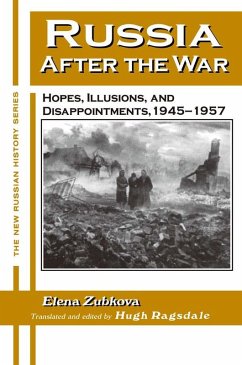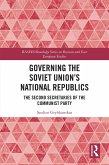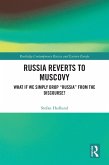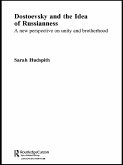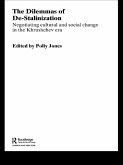Elena Zubkova, University of Alabama
Russia After the War (eBook, ePUB)
Hopes, Illusions and Disappointments, 1945-1957
45,95 €
45,95 €
inkl. MwSt.
Sofort per Download lieferbar

23 °P sammeln
45,95 €
Als Download kaufen

45,95 €
inkl. MwSt.
Sofort per Download lieferbar

23 °P sammeln
Jetzt verschenken
Alle Infos zum eBook verschenken
45,95 €
inkl. MwSt.
Sofort per Download lieferbar
Alle Infos zum eBook verschenken

23 °P sammeln
Elena Zubkova, University of Alabama
Russia After the War (eBook, ePUB)
Hopes, Illusions and Disappointments, 1945-1957
- Format: ePub
- Merkliste
- Auf die Merkliste
- Bewerten Bewerten
- Teilen
- Produkt teilen
- Produkterinnerung
- Produkterinnerung

Bitte loggen Sie sich zunächst in Ihr Kundenkonto ein oder registrieren Sie sich bei
bücher.de, um das eBook-Abo tolino select nutzen zu können.
Hier können Sie sich einloggen
Hier können Sie sich einloggen
Sie sind bereits eingeloggt. Klicken Sie auf 2. tolino select Abo, um fortzufahren.

Bitte loggen Sie sich zunächst in Ihr Kundenkonto ein oder registrieren Sie sich bei bücher.de, um das eBook-Abo tolino select nutzen zu können.
The years of late Stalinism are one of the murkiest periods in Soviet history, best known to us through the voices of Ehrenburg, Khrushchev and Solzhenitsyn. This history of Russia from the end of the war to the Thaw is by a respected young historian, who draws upon newly-opened archives.
- Geräte: eReader
- mit Kopierschutz
- eBook Hilfe
- Größe: 1.6MB
Andere Kunden interessierten sich auch für
![Governing the Soviet Union's National Republics (eBook, ePUB) Governing the Soviet Union's National Republics (eBook, ePUB)]() Saulius GrybkauskasGoverning the Soviet Union's National Republics (eBook, ePUB)43,95 €
Saulius GrybkauskasGoverning the Soviet Union's National Republics (eBook, ePUB)43,95 €![Singapore in the Global System (eBook, ePUB) Singapore in the Global System (eBook, ePUB)]() Peter PrestonSingapore in the Global System (eBook, ePUB)34,95 €
Peter PrestonSingapore in the Global System (eBook, ePUB)34,95 €![Russia Reverts to Muscovy (eBook, ePUB) Russia Reverts to Muscovy (eBook, ePUB)]() Stefan HedlundRussia Reverts to Muscovy (eBook, ePUB)42,95 €
Stefan HedlundRussia Reverts to Muscovy (eBook, ePUB)42,95 €![Swift: The Man, his Works, and the Age (eBook, ePUB) Swift: The Man, his Works, and the Age (eBook, ePUB)]() Irvin EhrenpreisSwift: The Man, his Works, and the Age (eBook, ePUB)51,95 €
Irvin EhrenpreisSwift: The Man, his Works, and the Age (eBook, ePUB)51,95 €![Dostoevsky and The Idea of Russianness (eBook, ePUB) Dostoevsky and The Idea of Russianness (eBook, ePUB)]() Sarah HudspithDostoevsky and The Idea of Russianness (eBook, ePUB)57,95 €
Sarah HudspithDostoevsky and The Idea of Russianness (eBook, ePUB)57,95 €![Russia at the Barricades (eBook, ePUB) Russia at the Barricades (eBook, ePUB)]() Victoria E. BonnellRussia at the Barricades (eBook, ePUB)42,95 €
Victoria E. BonnellRussia at the Barricades (eBook, ePUB)42,95 €![The Dilemmas of De-Stalinization (eBook, ePUB) The Dilemmas of De-Stalinization (eBook, ePUB)]() The Dilemmas of De-Stalinization (eBook, ePUB)46,95 €
The Dilemmas of De-Stalinization (eBook, ePUB)46,95 €-
-
-
The years of late Stalinism are one of the murkiest periods in Soviet history, best known to us through the voices of Ehrenburg, Khrushchev and Solzhenitsyn. This history of Russia from the end of the war to the Thaw is by a respected young historian, who draws upon newly-opened archives.
Dieser Download kann aus rechtlichen Gründen nur mit Rechnungsadresse in A, B, BG, CY, CZ, D, DK, EW, E, FIN, F, GR, HR, H, IRL, I, LT, L, LR, M, NL, PL, P, R, S, SLO, SK ausgeliefert werden.
Produktdetails
- Produktdetails
- Verlag: Taylor & Francis eBooks
- Seitenzahl: 250
- Erscheinungstermin: 4. März 2015
- Englisch
- ISBN-13: 9781317460572
- Artikelnr.: 42510236
- Verlag: Taylor & Francis eBooks
- Seitenzahl: 250
- Erscheinungstermin: 4. März 2015
- Englisch
- ISBN-13: 9781317460572
- Artikelnr.: 42510236
- Herstellerkennzeichnung Die Herstellerinformationen sind derzeit nicht verfügbar.
Elena Zubkova is a senior research fellow at the Institute of Russian History, Russian Academy of Sciences. She received her degrees from the Moscow State Historical Archival Institute (B.A.) and the Institute of Russian History (Ph.D.) and has worked at the Moscow State Archive of the October Revolution (now GARF). Dr. Zubkova has published many essays and articles on postwar history, and the book Society and Reforms, 1945-1964 (in Russian; Rossiia molodaia, 1993).,
Hugh Ragsdale studied at the University of North Carolina (A.B.) and the University of Virginia (M.A., Ph.D.). He has done postgraduate study at Moscow State University and the Soviet/Russian Academy of Sciences and has worked in the foreign affairs archives of London, Paris, Vienna, Copenhagen, and Stockholm, as well as Moscow. His most recent book is The Russian Tragedy: The Burden of History (M.E. Sharpe, 1996).,
Hugh Ragsdale studied at the University of North Carolina (A.B.) and the University of Virginia (M.A., Ph.D.). He has done postgraduate study at Moscow State University and the Soviet/Russian Academy of Sciences and has worked in the foreign affairs archives of London, Paris, Vienna, Copenhagen, and Stockholm, as well as Moscow. His most recent book is The Russian Tragedy: The Burden of History (M.E. Sharpe, 1996).,
Introduction
Part 1 Strategies of Survival
Chapter 1 The Social Psychology of the War
Chapter 2 The Victory and the Victors
Chapter 3 "How to Live After the War?": The Conflict of Expectation and Reality
Chapter 4 The Hungry Years: The Famine of 1946-1947
Chapter 5 The Currency Reform of 1947: The Views from Above and Below
Part 2 The Illusion of Liberalization
Chapter 6 The State and the Peasant: Village Antagonism to the Collective Farm
Chapter 7 Religion and Politics: The Revival of Religions Belief
Chapter 8 The Political Temper of the Masses, 1945-1948
Chapter 9 "Something Must Be Done": The Intelligentsia and the Intellectual Mavericks
Part 3 Repression
Chapter 10 "The Situation Doesn't Change": The Crisis of Postwar Expectations
Chapter 11 The Birth of the Anti-Stalinist Youth Movement
Chapter 12 The Struggle with Dissent
Chapter 13 The Wave of Repression, 1949-1953
Chapter 14 The Evolution of Public Opinion: "Whose Fault Is It?"
Part 4 The Thaw
Chapter 15 Without Stalin: The New Public Atmosphere
Chapter 16 The Repudiation of the GULAG
Chapter 17 Turning to the Individual: The Paths from Above and Below
Chapter 18 The Decision on the Cult of Personality and Its Social Impact
Chapter 19 Public Opinion and the "Hungarian Syndrome"
con Conclusion
Part 1 Strategies of Survival
Chapter 1 The Social Psychology of the War
Chapter 2 The Victory and the Victors
Chapter 3 "How to Live After the War?": The Conflict of Expectation and Reality
Chapter 4 The Hungry Years: The Famine of 1946-1947
Chapter 5 The Currency Reform of 1947: The Views from Above and Below
Part 2 The Illusion of Liberalization
Chapter 6 The State and the Peasant: Village Antagonism to the Collective Farm
Chapter 7 Religion and Politics: The Revival of Religions Belief
Chapter 8 The Political Temper of the Masses, 1945-1948
Chapter 9 "Something Must Be Done": The Intelligentsia and the Intellectual Mavericks
Part 3 Repression
Chapter 10 "The Situation Doesn't Change": The Crisis of Postwar Expectations
Chapter 11 The Birth of the Anti-Stalinist Youth Movement
Chapter 12 The Struggle with Dissent
Chapter 13 The Wave of Repression, 1949-1953
Chapter 14 The Evolution of Public Opinion: "Whose Fault Is It?"
Part 4 The Thaw
Chapter 15 Without Stalin: The New Public Atmosphere
Chapter 16 The Repudiation of the GULAG
Chapter 17 Turning to the Individual: The Paths from Above and Below
Chapter 18 The Decision on the Cult of Personality and Its Social Impact
Chapter 19 Public Opinion and the "Hungarian Syndrome"
con Conclusion
Introduction
Part 1 Strategies of Survival
Chapter 1 The Social Psychology of the War
Chapter 2 The Victory and the Victors
Chapter 3 "How to Live After the War?": The Conflict of Expectation and Reality
Chapter 4 The Hungry Years: The Famine of 1946-1947
Chapter 5 The Currency Reform of 1947: The Views from Above and Below
Part 2 The Illusion of Liberalization
Chapter 6 The State and the Peasant: Village Antagonism to the Collective Farm
Chapter 7 Religion and Politics: The Revival of Religions Belief
Chapter 8 The Political Temper of the Masses, 1945-1948
Chapter 9 "Something Must Be Done": The Intelligentsia and the Intellectual Mavericks
Part 3 Repression
Chapter 10 "The Situation Doesn't Change": The Crisis of Postwar Expectations
Chapter 11 The Birth of the Anti-Stalinist Youth Movement
Chapter 12 The Struggle with Dissent
Chapter 13 The Wave of Repression, 1949-1953
Chapter 14 The Evolution of Public Opinion: "Whose Fault Is It?"
Part 4 The Thaw
Chapter 15 Without Stalin: The New Public Atmosphere
Chapter 16 The Repudiation of the GULAG
Chapter 17 Turning to the Individual: The Paths from Above and Below
Chapter 18 The Decision on the Cult of Personality and Its Social Impact
Chapter 19 Public Opinion and the "Hungarian Syndrome"
con Conclusion
Part 1 Strategies of Survival
Chapter 1 The Social Psychology of the War
Chapter 2 The Victory and the Victors
Chapter 3 "How to Live After the War?": The Conflict of Expectation and Reality
Chapter 4 The Hungry Years: The Famine of 1946-1947
Chapter 5 The Currency Reform of 1947: The Views from Above and Below
Part 2 The Illusion of Liberalization
Chapter 6 The State and the Peasant: Village Antagonism to the Collective Farm
Chapter 7 Religion and Politics: The Revival of Religions Belief
Chapter 8 The Political Temper of the Masses, 1945-1948
Chapter 9 "Something Must Be Done": The Intelligentsia and the Intellectual Mavericks
Part 3 Repression
Chapter 10 "The Situation Doesn't Change": The Crisis of Postwar Expectations
Chapter 11 The Birth of the Anti-Stalinist Youth Movement
Chapter 12 The Struggle with Dissent
Chapter 13 The Wave of Repression, 1949-1953
Chapter 14 The Evolution of Public Opinion: "Whose Fault Is It?"
Part 4 The Thaw
Chapter 15 Without Stalin: The New Public Atmosphere
Chapter 16 The Repudiation of the GULAG
Chapter 17 Turning to the Individual: The Paths from Above and Below
Chapter 18 The Decision on the Cult of Personality and Its Social Impact
Chapter 19 Public Opinion and the "Hungarian Syndrome"
con Conclusion
